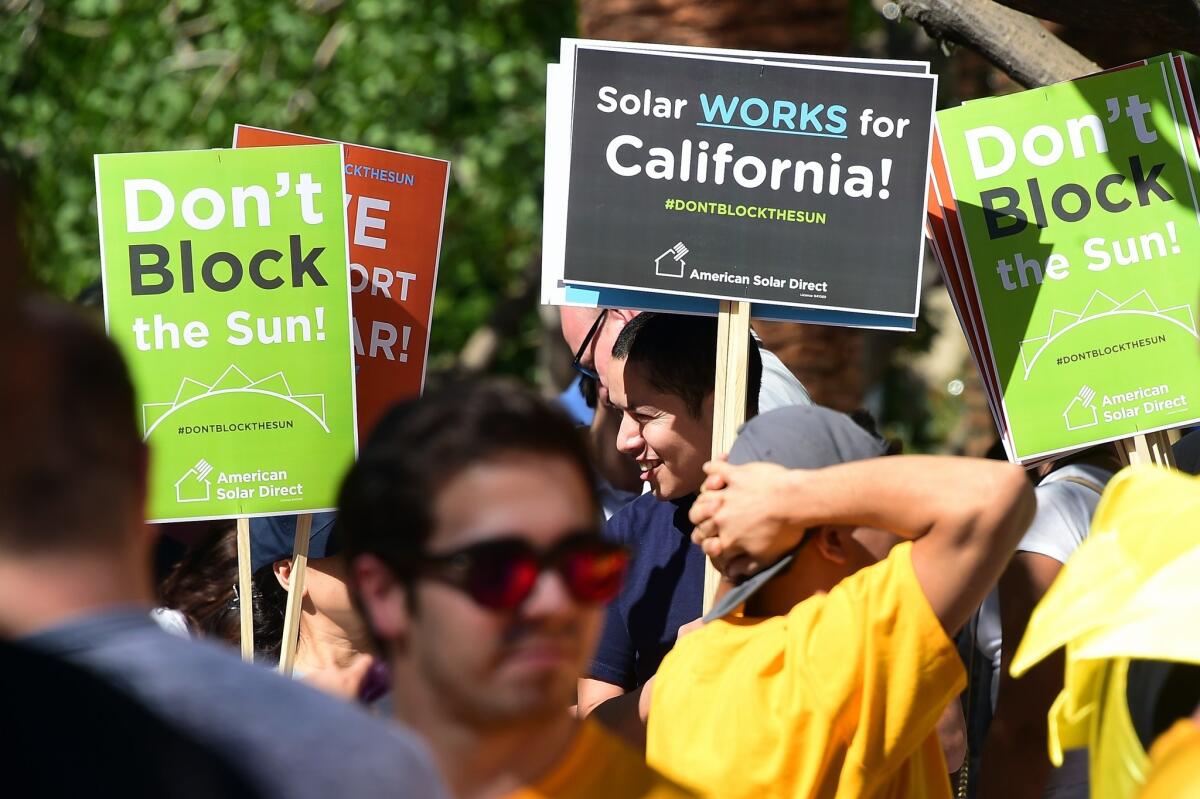California regulators propose new rooftop solar fees

Solar proponents have been rallying to block changes to rooftop solar costs. On Tuesday, state regulators proposed new fees for solar customers.
- Share via
Rooftop solar panel owners could face new fees under a proposal issued Tuesday, but state regulators rejected several recommendations by utility companies that threatened the expansion of residential and commercial solar efforts.
Southern California Edison and the state’s other big investor-owned utilities had pushed to charge more for homes and businesses with rooftop solar panels to connect to the electric grid and use power from utilities when needed. The companies also advocated paying lower rates to panel owners who sold them their extra electricity.
Despite the utilities’ campaign, the California Public Utilities Commission largely backed the solar industry, which had said the power companies’ proposals could have devastated its business.
SIGN UP for the free California Inc. business newsletter >>
Under the PUC plan, new solar customers would face a one-time fee for connection to the electric grid. The commission estimates that the fee would range from $75 to $150 per solar customer.
In addition, rooftop solar customers would pay a fee of 2 cents to 3 cents per kilowatt-hour for electricity used from the utility companies, no matter how much power their solar systems generate. This fee would amount to about $5 a month for the average solar user.
Utilities also would place new solar customers on time-of-use rates, which rise during periods of high electricity demand.
Existing owners are exempted from all the changes for 20 years from when they installed their solar systems and connected to the grid.
Sara Kamins, supervisor of the PUC’s customer generation program, said the proposed changes are designed to get rooftop solar owners to pay their fair share for maintaining the electric system while ensuring that the added fees don’t harm solar-panel owners.
The 2-cent to 3-cent fee, Kamins said, helps to pay for programs such as energy-efficiency efforts that benefit disadvantaged communities.
“We’re still figuring out what a solar customer’s fair share is,” Kamins said.
As for the connection charge — previously borne by all utility customers — “We think they can pay that fee without jeopardizing the economics of the installation,” she said.
The PUC will accept public comment on the proposed fees through mid-January and is expected to make a final decision at its Jan. 28 meeting.
At issue is the practice of net metering, in which utilities credit solar users for surplus power their systems create; that electricity gets fed back into the grid for use by other customers. Solar users are credited at the same rate they would pay the utility for electricity.
Kamins said the proposed decision leaves the current net metering policy largely intact.
See more of our top stories on Facebook >>
The PUC’s overhaul of the old solar rules was mandated by the state Legislature, which wanted to encourage the continued growth of rooftop solar installations while spreading costs fairly to all electricity users. The new rules would take effect by July 2017.
Utility proposals called for changes such as crediting solar users at about half the current rates. Utilities also wanted to charge monthly fees based on the size of a homeowner’s solar system, which would have been higher than what the commission is proposing.
Southern California Edison decried the proposed decision as insufficient and unfair to non-solar customers.
“SCE wants rooftop solar to expand in California, and there is a more balanced way to get this done,” said Ron Nichols, Edison’s senior vice president of regulatory affairs. “A much more fair approach would maintain some level of subsidy, but at far lower levels, while rooftop solar continues to grow.”
San Diego Gas & Electric expressed disappointment “that today’s proposed decision on the rooftop solar subsidy does not address the growing cost burden among our customers. Workable solutions must be developed to create a future where all customers can receive benefits.”
“We will continue to engage the CPUC with the hope of finding a better solution than what is in today’s proposed decision,” the utility said in a statement
Pacific Gas & Electric said the proposed decision “falls well short of what is needed to ensure sustainable growth of solar.”
“Consumer advocates and environmentalists alike agree that change in solar rates is needed,” Steve Malnight, PG&E’s senior vice president of regulatory affairs, said in a statement.
“Some solar company executives will say that the sky is falling if we make any changes, but the truth is that solar’s bright future will only be assured by moving forward with smart energy reform. Solar is too important to our state’s energy future not to get it right,” Malnight said.
The debate over California solar costs could shape solar policies throughout the nation as utilities seek ways to tinker with the costs and benefits of solar. Other states look to California as an innovator on solar policy. The state by far leads the nation in deployment of rooftop and utility-scale solar technology, followed by Arizona, New Jersey, North Carolina and Nevada.
Onerous fees could make solar-power systems unaffordable, industry representatives said.
Solar proponents praised the commission’s proposed decision and said they looked forward to an even stronger final version for consumers.
“We support the PUC’s proposed decision to continue the state’s successful net metering policy,” said Lyndon Rive, chief executive of rooftop solar giant SolarCity. Rive said the proposed decision “recognizes the important role of rooftop solar in accelerating our transition to a clean energy economy and providing customer choice.
Bernadette Del Chiaro, director of the California Solar Energy Industries Assn., said: “Gov. [Jerry] Brown’s PUC is standing up for clean power and for customers by proposing to reject the utilities’ attempts to make solar out of reach for customers.”
Twitter: @ivanlpenn
ALSO
Deadline to sign up for health coverage extended as applicants flood Obamacare website
California reaches $26-million settlement with Comcast over electronic waste
Howard Stern signs a new five-year deal with SiriusXM
More to Read
Inside the business of entertainment
The Wide Shot brings you news, analysis and insights on everything from streaming wars to production — and what it all means for the future.
You may occasionally receive promotional content from the Los Angeles Times.











